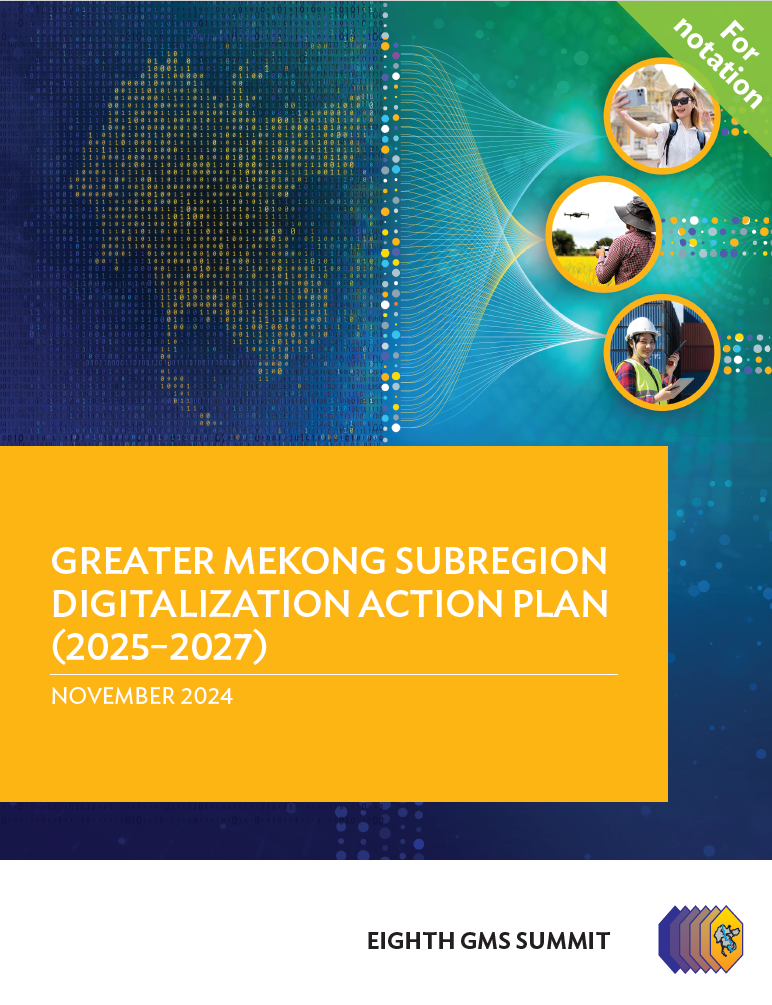Digitalization
Digitalization will help further the mandate of the GMS 2030 to build a robust, regionally integrated economy that is prepared to withstand a competitive external environment, fully equipped to seize new opportunities, and capable of addressing the medium- to long-term challenges of economic and social risks brought by the coronavirus disease (COVID-19) pandemic.
Learn More

GMS Digitalization Action Plan (2025–2027)
The Greater Mekong Subregion (GMS) Digitalization Action Plan (2025–2027) leverages the findings of the Scoping Study: Formulating a Digitalization Action Plan for the GMS. It provides thorough guidance for GMS governments to prioritize, operationalize, and concretize the digitalization of their economies. It provides a set of overarching actions, as well as sector-specific initiatives, that GMS economies can implement collectively and individually while considering the specific needs and capabilities of individual GMS countries. This document was approved for notation at the 8th GMS Summit held in Kunming, People's Republic of China (PRC).

GMS Digital Economy Cooperation Initiative
The Greater Mekong Subregion (GMS) Digital Economy Cooperation Initiative was developed and proposed by the People’s Republic of China with the support of other GMS countries and endorsed at the 25th GMS Ministerial Conference. It provides a framework for cooperation to promote inclusive digitalization and the use of advanced technologies in all GMS Program activities and projects.
Objectives
Promote trade facilitation
Encourage the promotion of cross-border e-commerce development; streamline trade procedures; streamline trade cost reduction; promote wider engagement with enterprises and consumers; maximize the potential of trade digitization; fuel the transformation of traditional trade and high-quality development
Expedite digital connectivity
Accelerate the construction of digital infrastructure; optimize telecommunication access; increase broadband penetration rate
Encourage digital technology innovation
Encourage governments, enterprises, investment institutions, and research institutions to share experiences and best practices in promoting innovation and improving the transfer of innovation; intensify collaboration with international organizations to promote standard compatibility and mutual recognition in the digital field
Accelerate digital finance development
Encourage international and regional financial institutions to support major digital infrastructure investments via capital and financial public products
Improve digital inclusiveness
Strengthen capacity building and technological assistance to cultivate digital talents and increase the participation of small and medium-sized enterprises (SMEs) and women
Advance digital governance
Strengthen dialogue and coordination on crucial issues based on mutual interests; explore ways to enhance cooperation for information sharing on laws, regulations, standards, and policy measures
Areas of cooperation
Click on the images below to know more

Digital Sectors
Promote the development of digital industrialization and industry digitization through innovation toward new digital models and new formats. Cooperation will be enhanced—including but not limited to “single window,” paperless clearances, e-invoices, e-payments, e-authentication, e-signatures, online payments, and consumer protection.

Digital Infrastructure
Address the deficit of digital infrastructure in the subregion by working together to formulate a list of priority projects and mobilize the resources of member governments, multilateral development institutions, and the private sector to support digital infrastructure projects on, for instance, 5G, optical fiber broadband, backbone transmission network, and data centers to advance subregional connectivity.

Digital Innovation
- Promote the development of digital software to maximize the use of existing digital hardware infrastructure.
- Strengthen exchanges and cooperation in the fields of 5G, cloud computing, digital identity, big data, the Internet of Things, the Industrial Internet of Things, blockchain, and artificial intelligence, among others, to tap the potential of emerging technologies and cultivate new business models.

Advance Regional Digital Finance
International financial institutions are encouraged to coordinate with regional finance-related institutions to launch more strategic policies and innovative financing models that are conducive to the development of the digital economy.

Deepen Digital Inclusion
- Carry out capacity building vigorously to expand opportunities for SMEs and women to develop skills and improve participation in the digital economy.
- Provide technical assistance and encourage members to share experiences and practices, to advance digital technology to help reduce poverty and inequality.

Strengthen digital governance system and capabilities
Members are encouraged to strengthen communication and discussion on digital policies and international rules through policy dialogues, to jointly promote the healthy development of the digital economy along GMS economic corridors.
Next Steps
Click on each item to expand
• This will investigate and analyze the current situation, opportunities, and challenges of digital economy development in the subregion and put forward suggestions and measures to accelerate the development of digital economy.
• To address the gap in digital infrastructure, the program will formulate a list of key projects that will be included in the GMS Regional Investment Framework, to encourage relevant governments to give priority and increase input, as well as to attract investments from multilateral and bilateral institutions and private capital.
• The platform will also explore emerging digital economy issues to meet the needs of members in developing the digital economy and better adapting to the trend of digital economy in the subregion.
• Each working group or task force will be encouraged to develop programs according to its function, focusing on issues of common interest, such as technical assistance and capacity building, training courses, seminars, policy exchange, and experience sharing, to help policymakers improve digital governance.

